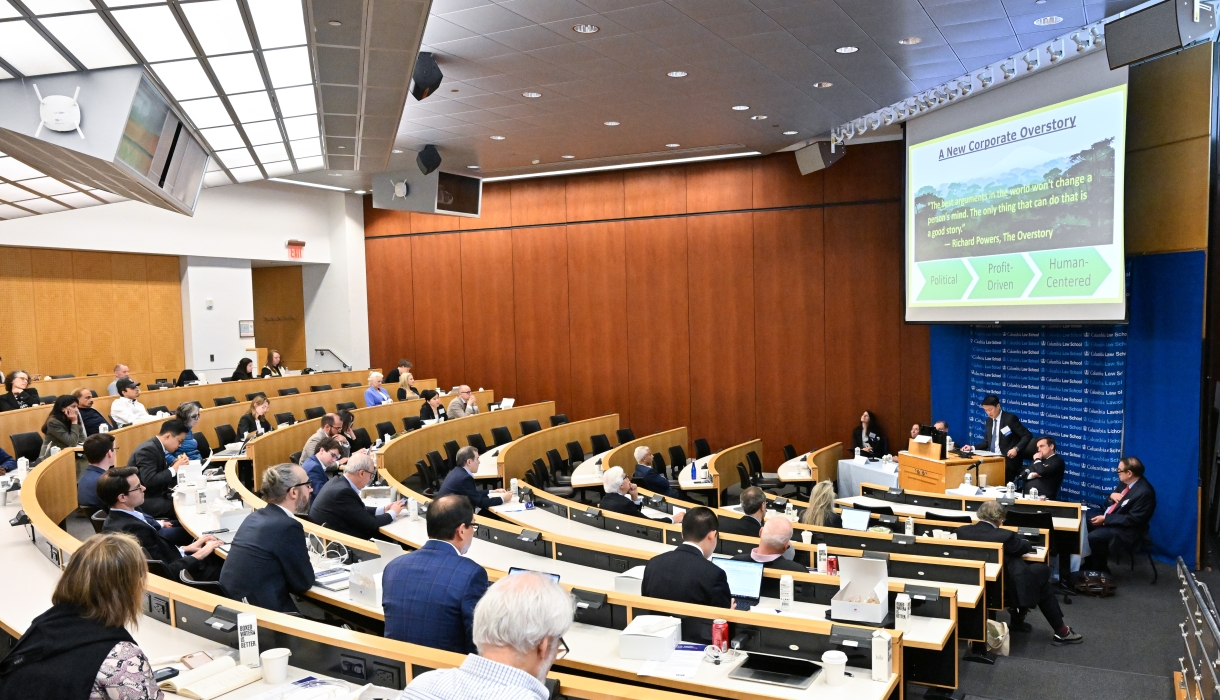2025 Ira M. Millstein Memorial Conference Focuses on Evolving Corporate Governance Challenges
The second annual event, sponsored by the Ira M. Millstein Center for Global Markets and Corporate Ownership, explored recent developments in the finance and governance of large public corporations.

Legal scholars, business experts, and corporate law practitioners gathered at the second annual Ira M. Millstein Memorial Conference, sponsored by the Ira M. Millstein Center for Global Markets and Corporate Ownership, to explore fast-moving developments in capital markets and corporate governance.
Daniel Abebe, Dean and Lucy G. Moses Professor of Law, and Dorothy S. Lund, Columbia 1982 Alumna Professor of Law and faculty co-director of the Millstein Center, welcomed participants to the event, held April 25 in Columbia Law School’s Jerome L. Greene Hall. The conference honors corporate governance expert Ira M. Millstein ’49 (1926–2024).
Recent political and corporate governance developments have brought a level of change and uncertainty that rivals the hostile takeover wave of the 1980s, Lund said. “It’s fitting that today’s conference is bringing together distinguished academics and practitioners in an independent forum for reasoned examination of the present environment as well as what’s coming in the future.”
The conference’s four panels covered the impact of private equity investing on the finance and governance of public companies, new Delaware corporate law, corporate political involvement, and changes in SEC guidance.
Watch videos from the conference:
“Relational Investors, Private Equity Investing, and Shareholder Control Agreements”
Jeffrey N. Gordon, Richard Paul Richman Professor of Law and faculty co-director of the Millstein Center, moderated the panel; Gabriel V. Rauterberg, professor of law, University of Michigan Law School, and former academic fellow at Columbia Law School, presented his scholarship on the role of private equity firms in governance of publicly held companies in which they invest. Panelists: Brian Broughman, professor of law, Vanderbilt Law School; Elizabeth Cooper ’01, a partner at Simpson Thacher & Bartlett; and Elisabeth de Fontenay, Karl W. Leo Distinguished Professor of Law, Duke Law School.
“The Threat to Delaware and the Legislative Response”
Moderated by Zohar Goshen, Jerome L. Greene Professor of Transactional Law, the panel examined the widely reported relocation of publicly held companies from Delaware, such as Tesla’s move to Texas and Dropbox’s reincorporation in Nevada, as well as the subsequent state legislation designed to retain corporations in Delaware by making it harder to sue corporate directors and officers for conflicts of interest and self-dealing. Panelists: Michal Barzuza, professor of law and director of the John W. Glynn Jr. Law & Business Program, University of Virginia School of Law; Edward Rock, Martin Lipton Professor of Law and co-director of the Institute for Corporate Governance & Finance, New York University School of Law; William Savitt ’97, partner at Wachtell, Lipton, Rosen & Katz; and Jeroen van Kwawegen ’03, partner at Bernstein Litowitz Berger & Grossmann.
“The Corporation (and Controlling Shareholders) in Politics in 2025”
Lund moderated a discussion on the realities of corporations and controlling shareholders in politics in modern times. The panel considered the benefits and risks, to corporations and the broader public, that come from such activity, as well as channels for influence and proposals for reform. Panelists: Jill E. Fisch, Saul A. Fox Distinguished Professor of Business Law, University of Pennsylvania Carey Law School; R. Glenn Hubbard, Dean Emeritus and Russell L. Carson Professor of Finance and Economics, Columbia Business School; Robert J. Jackson Jr., Nathalie P. Urry Professor of Law, director of the Jacobson Leadership Program in Law and Business and co-director of the Institute for Corporate Governance and Finance, New York University School of Law; Tom C.W. Lin, Murray H. Shusterman Chair in Transactional & Business Law, Temple University Beasley School of Law; and Jeffrey A. Sonnenfeld, senior associate dean for leadership studies and Lester Crown Professor in the Practice of Management, Yale School of Management.
“Regulatory Restraints on Investor Voice”
Joshua Mitts, David J. Greenwald Professor of Law, moderated the day’s final panel—a discussion of the impact of recent SEC guidance on required disclosures for institutional investors. Panelists: John Coates, John F. Cogan Jr. Professor of Law and Economics, Harvard Law School; Erik Gerding, partner at Freshfields; Drew Hambly, investment director, CalPERS; Robert McCormick, executive director, Council of Institutional Investors; and Allie M. Rutherford, partner at PJT Camberview.
